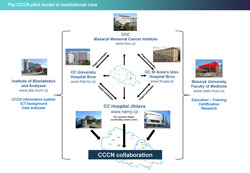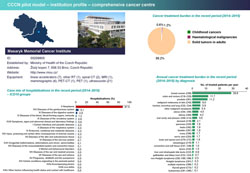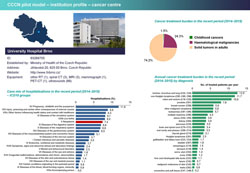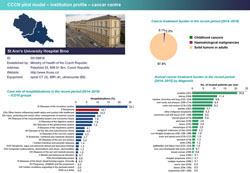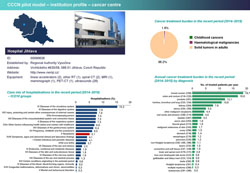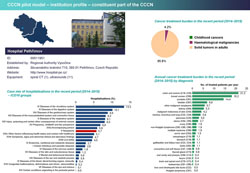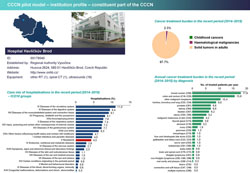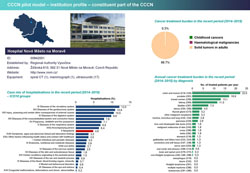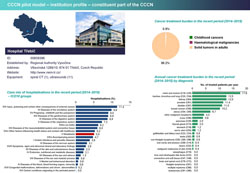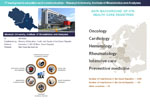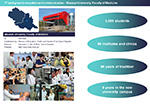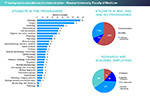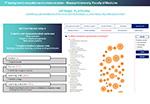Definition of the pilot network of South-West Moravia (SW Moravia)
A pilot model of Comprehensive Cancer Care Network (CCCN) has been set up in the Czech Republic, namely in the so-called South-West Moravia (SW Moravia) – an area consisting of two administrative regions: the Vysočina Region and the South Moravian Region. The structure, principles and other features of this model are described below.
Structure of the CCCN
Our pilot model of CCCN involves eight hospitals, namely one highly specialised national comprehensive cancer centre, three regional cancer centres and four general hospitals. Establishment of the pilot model was based on a long-term experience and an exclusive position of the Masaryk Memorial Cancer Institute (MMCI, a high-volume Comprehensive Cancer Centre) and its close cooperation with Hospital Jihlava (a key part of the Comprehensive Cancer Centre of the Vysočina Region) and two university hospitals geographically close to MMCI: University Hospital Brno and St Ann's University Hospital Brno. All of the above-mentioned healthcare facilities have a very broad expertise covering all modalities of cancer treatment, including treatment of rare cancers and childhood cancers.
For example, the Department of Haemato-Oncology at the University Hospital Brno is a high-volume centre focused on haematological malignancies; and the Department of Paediatric Haematology and Oncology of the same hospital – although physically located in another area of the City of Brno – is one of two specialised Children’s Cancer Centres in the Czech Republic (the other one is located in the Capital of Prague).
This consortium of core centres was at the very start of the pilot CCCN and took responsibility for the development of binding cancer care protocols, rules of multidisciplinary teams and quality assessment standards. Cooperation with four other general hospitals in the Vysočina Region was established on the basis of a written agreement; and finally, the newly established CCCN was supplemented with local cancer research teams, tissue banks, bioinformatics facilities and institutions providing medical education (Faculty of Medicine of the Masaryk University in the City of Brno). The ICT background of the CCCN is has been developed and managed by the Institute of Biostatistics and Analyses of the Masaryk University.
Principles of the CCCN
The CCCN model was developed within the Czech healthcare system with due regard to the following key principles which can also be applied as policy recommendations:
- The formation of the CCCN was based on a voluntary decision of healthcare providers. Political authorities favoured close collaboration among healthcare providers, but there was no compulsion to take part in the CCCN.
- The CCCN was established not as parallel/alternative to other organisations in the chosen area, but as the preferable global model. Pre-existing cancer care facilities were never removed: rather, they improved. Thus, creation of the CCCN has not resulted in competition with other institutions.
- Operation of the CCCN needed to be supported by new legislation, so that hospitals that participate could do so legally. The legal framework also makes it possible to centralise processing of clinical data: initially one of the major obstacles to be overcome.
- The CCCN does not comprise only the hospital sector, but also diagnostic centres, primary care providers and palliative care units. This is facilitated by a common information system. Cancer research and educational facilities are also included.
- A legally binding written agreement has been signed by the institutions that form the CCCN, defining its organisation and governance. There is a shared system of multidisciplinary cancer management teams, common clinical protocols to which all must adhere, a common information system, and a common database supporting a unified quality assurance system.
The objectives of the information system of the CCCN include the following: identification of inequalities in care; feedback control of effectiveness of interventions supporting equity; population-based quantification of outcomes using uniform performance indicators.
Overview of healthcare
The overall structure of healthcare in SW Moravia (the Vysočina Region and the South Moravian Region) corresponds to healthcare in the entire territory of the Czech Republic. There is a network of primary healthcare providers (namely general practitioners for adults, general practitioners for children and adolescents, gynaecologists and other outpatient specialists), cancer screening centres, providers of acute and long-term inpatient care, and last but not least providers of palliative care. These facilities are established by the Ministry of Health of the Czech Republic (university hospitals and the Masaryk Memorial Cancer Institute), by individual regional authorities (regional hospitals and district hospitals), or by private sector entities.
Preventive healthcare is reimbursed from the public health insurance, and is largely provided by general practitioners (one preventive check-up every two years); on top of that, women are entitled to have a yearly gynaecological check-up. General practitioners usually refer patients to specialised healthcare, which is provided in outpatient facilities (largely private ones) as well as in hospitals.
Structure of acute inpatient care in the CCCN pilot model regions
| Type of facility | VYS | SMR |
|---|---|---|
| University hospital | - | 2 |
| Hospital | 6 | 18 |
| Hospital of follow-up care | - | 2 |
| Long-term care hospital (LTCH) | 4 | 2 |
| Hospice | - | 2 |
| Psychiatric hospital | 3 | 1 |
| Sanatorium for tuberculosis and respiratory diseases | 1 | - |
| Rehabilitation institute | 1 | - |
| Children’s psychiatric hospital | 1 | - |
| Other paediatric specialised therapeutic institutes | - | 3 |
| Spa sanatorium | - | 2 |
| Other inpatient facilities | - | 1 |
Hospital-based acute inpatient care
Acute inpatient care is provided by a network of hospitals located in regional capitals (Jihlava, Brno) as well as in smaller local towns. Highly specialised care across many medical specialties (including oncology) is concentrated mainly in two university hospitals in Brno, whereas the Masaryk Memorial Cancer Institute is highly specialised in oncology and all aspects of cancer care. The network is completed with 8 hospitals in Brno (both public and private ones) and 10 hospitals in other towns of the South Moravian Region (established by the Regional Authority).
Acute inpatient care in the Vysočina Region is provided by 6 hospitals, out of which 5 are established by the Regional Authority, and one is privately owned. Hospital Jihlava provides the most comprehensive care when compared to other hospitals in the Vysočina Region. Nevertheless, patients requiring highly specialised care, which is not available in Hospital Jihlava, are usually referred to university hospitals in Brno, or to the Masaryk Memorial Cancer Institute.
Other specialised hospitals of different sizes and with different scopes of mission supplement the network of inpatient care in both regions.
Summary of cancer care in the target area of the CCCN pilot model
| Type of facility | VYS | SMR |
|---|---|---|
| Comprehensive cancer centre | 0 | 1 |
| Cancer centre | 1 | 2 |
| Haemato-oncology centre | 0 | 1 |
| Children’s cancer centre | 0 | 1 |
| Constituent parts of CCCN | 4 | 0 |
| Hospitals cooperating with CCCN | 4 | 16 |
| Breast cancer screening | 5 | 8 |
| Colorectal cancer screening | 10 | 19 |
| Cervical cancer screening | 1 | 4 |
| LTCH or hospice | 10 | 10 |
Cancer centres
Both regions have their networks of comprehensive cancer care, covering cancer prevention, diagnosis and treatment. Cancer centres are available in both regional capitals: one in Jihlava (Hospital Jihlava), and three in Brno (Masaryk Memorial Cancer Institute, University Hospital Brno, St Ann’s University Hospital Brno). The Masaryk Memorial Cancer Institute in Brno is a fully-fledged Comprehensive Cancer Centre (see below). Common indication committees, expert teams and treatment protocols have been established among the three cancer centres in Brno to ensure that each cancer patient will receive the best available cancer care, regardless of whether he/she will be treated in any of these mutually cooperating hospitals. However, University Hospital Brno has many years’ experience and is specialised in haemato-oncology and also in paediatric oncology, while other two centres focus mainly on diagnostics and treatment of solid tumours in adults. Cooperating closely with these cancer centres, district hospitals provide basic cancer care as well as follow-up of cancer patients.
Comprehensive Cancer Centre – Masaryk Memorial Cancer Institute
The Masaryk Memorial Cancer Institute (MMCI) plays the central role in cancer care in the South Moravian Region. It is a specialised comprehensive cancer centre with supraregional activity that is certified by two quality certificates: by the Joint Commission International (JCI), and by the Joint Accreditation Commission of the Czech Republic (SAK ČR). MMCI concentrates all essential branches of medicine to ensure comprehensive care, including cancer prevention, epidemiology and diagnostics, and particular modalities of cancer treatment and physiotherapy. Each year, almost 10,000 patients are hospitalised in MMCI and about 200,000 people pass through its outpatient departments. Focusing on research and scientific activities including basic research, MMCI is also involved in undergraduate and postgraduate education of doctors and other healthcare professionals as well as popular science activities aimed at wide public.
| Geographic view of the CCCN | ||||
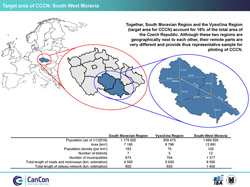 |
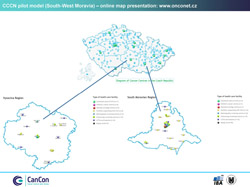 |
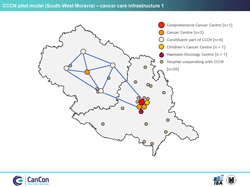 |
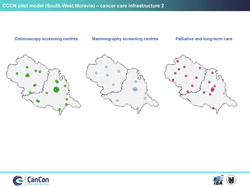 |
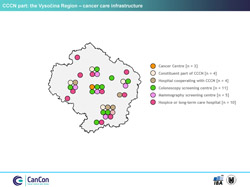 |
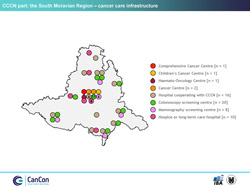 |
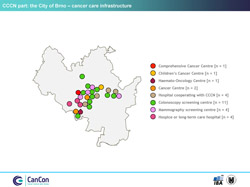 |
|||
Cancer research
The CCCN pilot model includes institutions that deal with both basic and applied cancer research. These institutions are interconnected with a variety of joint workplaces and projects, thus creating a consistent network for translation and validation of findings in clinical practice.
The Regional Centre for Applied Molecular Biology (RECAMO) is situated within the Masaryk Memorial Cancer Institute and focuses on key expertise in clinical cancer, transcriptomics, proteomics and basic cancer research. In each individual cancer patient, multidisciplinary approaches are used for an accurate determination of diagnosis and prognosis, and for the prediction of the expected patient’s response to treatment, based on the latest knowledge in cancer research and clinical practice. Cancer biology and genetics are also extensively investigated at the Faculty of Medicine of Masaryk University.
Applied clinical research in oncology is performed in all three cancer centres in Brno: Masaryk Memorial Cancer Institute (MMCI), University Hospital Brno, and St Ann’s University Hospital Brno. All of these facilities are involved in dozens of international clinical trials and other projects of clinical research, with respect to their general focus (solid tumours in MMCI and St Ann’s, haemato-oncology and paediatric oncology in University Hospital Brno).
Cancer epidemiology and health care informatics are the main research domains of the Institute of Biostatistics and Analyses of Masaryk University. The institute provides a comprehensive information background for the assessment of cancer epidemiology in the Czech Republic, national cancer screening programmes and monitoring of targeted therapies.
Education
The Faculty of Medicine of Masaryk University in Brno provides most of the medical education for the South Moravian Region and the Vysočina Region. The faculty is located in a new university campus just next to the University Hospital Brno. The faculty closely cooperates with both university hospitals and MMCI, mainly in the form of joint clinics and departments, including MMCI’s Department of Comprehensive Cancer Care. Education, research, and clinical practice are therefore closely interlinked and provide a complex background for cancer research and cancer care.
The faculty offers a 6-year study programme of General Medicine (MD degree). Other programmes (BSc and MSc degree), however, have become an indispensable part of education of health professionals: in particular, health sciences have recently seen a large increase in the number of study programmes and students. The total number of students reached 3424 in 2015, out of which 2023 were in the MD study programme, and 1401 in other programmes.
E-learning and e-governance infrastructure
Development and implementation of modern teaching methods is a high-priority issue at the CCCN institutions, particularly those that employ new ICT technologies and multimedia.
The Faculty of Medicine is member of the international network MEFANET. The primary MEFANET objective is to facilitate the cooperation among Czech and Slovak medical and healthcare faculties, and to support progress in medical education using modern ICT tools, methods and technologies. The cooperation is based on the idea of an e-publishing system, which enables the participating faculties to share electronic teaching materials by means of a common portal platform, which is linked to a set of standalone web portals at individual faculties.
Medical communication, education and cooperation between oncologists is also enhanced by using a videoconference system. Seventy healthcare facilities are interconnected within the Czech Medical Videoconference Network. In oncology, this network serves for mutual communication among cancer centres mainly for consultations regarding intensive and complex treatment, but also for regional communication among cancer centres and other workplaces in the region. Multidisciplinary teams – consisting of diagnosticians, oncologists, surgeons, radiologists, pathologists and other specialists from different workplaces – meet on regular videoconference meetings to discuss therapeutic options in newly diagnosed patients.
